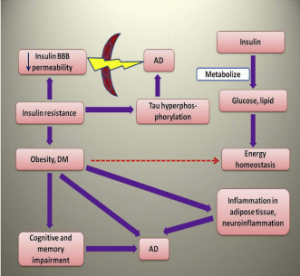Alzheimer’s and Type 2 Diabetes might be linked, but let’s break down what this means.
The Science Behind Alzheimer’s
Alzheimer’s Disease is characterized by plaques and tangles of proteins clumping up our brain. These plaques are an accumulation of the protein Amyloid-β and are found near neurons, the main cells in our brain. The tangles are from tau proteins accumulating in the neurons. [1] The plaques and tangles can disrupt important communication in our brain and even lead to cell death. This cell death will cause the individual to have problems with cognition and memory because fewer cells are working in the brain.

Insulin Resistance
Insulin resistance is the inability of our body to use insulin, even if insulin is present. This may sound familiar if you or a loved one has Type 2 Diabetes. In this type of diabetes, insulin may be present, but the body doesn’t use it. How is this linked to Alzheimer’s?

When Type 2 Diabetes sets in, our body starts to resist insulin. The causes of diabetes and insulin resistance will be discussed later. Since insulin is no longer being used, our protection against plaques and tangles decreases. Not only this, but diabetes can lead to increased inflammation due to fat sending inflammatory signals.
Inflammation, along with neuroinflammation (inflammation in the brain and spinal cord), can contribute to further insulin resistance to create a vicious cycle of worsening the body’s responses to insulin.
Since insulin is no longer protecting against plaques and tangles, cell death in learning and memory brain areas, and breaking down glucose, the brain may be at a higher risk for Alzheimer’s Disease.
Early treatments are being tested in which Alzheimer’s patients take Diabetes medications, and they have seen some cognitive benefits in those patients. More research is needed to fully understand the possible link between Alzheimer’s and Diabetes, but as a precautionary note, let’s examine some risk factors for insulin resistance developing.
Causes of Insulin Resistance and Type 2 Diabetes
Some causes of Type 2 Diabetes are out of our control, such as genetic make-up and family history. Our genes can determine if we’re more or less sensitive to insulin. [4]
Out of the modifiable factors, obesity is the strongest risk factor for developing Type 2 Diabetes. Increased abdominal fat can lead to more inflammation, which is harmful to insulin signaling. Additionally, an unhealthy diet and low physical activity can lead to Type 2 Diabetes. [5]

References
[1] Akhtar, A., & Sah, S. P. (2020). Insulin signaling pathway and related molecules: Role in neurodegeneration and Alzheimer’s disease. Neurochemistry International, 135, 104707. https://doi.org/10.1016/j.neuint.2020.104707
[2] Image from Pixabay.
[3] Akhtar, A., & Sah, S. P. (2020). Insulin signaling pathway and related molecules: Role in neurodegeneration and Alzheimer’s disease. Neurochemistry International, 135, 104707. https://doi.org/10.1016/j.neuint.2020.104707
[4,5] Galicia-Garcia, U., Benito-Vicente, A., Jebari, S., Larrea-Sebal, A., Siddiqi, H., Uribe, K. B., Ostolaza, H., & Martín, C. (2020). Pathophysiology of Type 2 Diabetes Mellitus. International journal of molecular sciences, 21(17), 6275. https://doi.org/10.3390/ijms21176275
[6] Imagine from Pixabay.